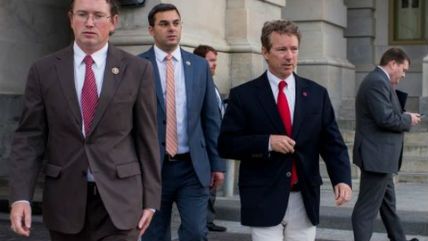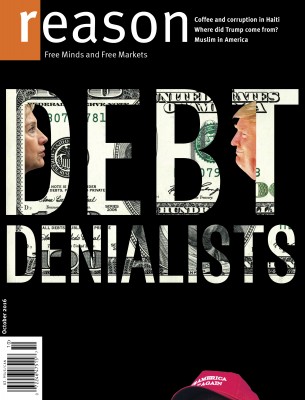Having Co-Opted the Tea Party Nationwide, Trump Tries to Stamp out its Remnants in Congress
The ultimate outsider candidate collaborates with the GOP establishment to marginalize the House Freedom Caucus and pivot toward centrist Democrats

Have you seen the latest craze among Trump administration officials and their enablers in the Republican establishment? It's called Pin the Blame for Ryancare on the House Freedom Caucus, and it starts right at the top:
Democrats are smiling in D.C. that the Freedom Caucus, with the help of Club For Growth and Heritage, have saved Planned Parenthood & Ocare!
— Donald J. Trump (@realDonaldTrump) March 26, 2017
This assessment of the famously stubborn, 29-member group is shared by an uncounted number of the their colleagues, and even one of their own: Rep. Ted Poe (R-Texas), who resigned from the caucus yesterday, explaining that, "Saying no is easy, leading is hard, but that is what we were elected to do." Also in the screw-you-guys,-I'm-going-home camp is Rep. Austin Scott (R-Georgia):
Mark Meadows betrayed Trump and America and supported Pelosi and Dems to protect Obamacare. https://t.co/zjcfmMhs9P
— Rep. Austin Scott (@AustinScottGA08) March 25, 2017
As the debacle was taking shape Friday, you saw a lot of such with-us-or-against-us talk:
Which @HouseGOP members will vote w/ @NancyPelosi today to keep Obamacare? Hard to believe any, but there are some who are…well, confused
— Hugh Hewitt (@hughhewitt) March 24, 2017
And it wasn't just on talk-radio Twitter. The Wall Street Journal, in a withering post-debacle editorial, asserted that the Freedom Caucus "sabotaged"…its "best chance to reform government":
[T]he result of their rule-or-ruin strategy will now be the ObamaCare status quo, and Mark Meadows (North Carolina), Jim Jordan (Ohio), Louie Gohmert (Texas) and the rest own all of its problems. Please spare everyone your future grievances about rising health spending or an ever-larger government.
The grand prize for cynicism goes to Senator Rand Paul, who campaigned against the bill while offering an alternative that hasn't a prayer of passing.
Now, there are plenty of contrary takes (see Conn Carroll, Justin Amash, and Reihan Salam, for starters). But the betting money is that both the Trump administration and the GOP establishment it now sits atop will seek actively to marginalize the rebels and instead find common governing cause with centrist Democrats, particularly in the United States Senate. If true, this scenario would produce one of the greatest cognitive dissonances in modern political history, while setting the administration up for even more humiliation during its honeymoon phase. Trump the above-the-fray outsider is collaborating with dealmaking career insiders to sideline one of the only principled Beltway blocs, even before showing any ability to woo Democrats over to Trump's anti-conservative agenda. It's all shaping up to be a godawful mess.
In a terrific New York Times Magazine article over the weekend, Robert Draper captured the quick devolution of Planet Trump's attitudes toward the House Freedom Caucus, and by extrapolation its Senate allies such as Rand Paul, Mike Lee, and Ted Cruz:
Early this year, [House Majority Leader Kevin] McCarthy predicted to me that the new president would quickly subjugate the Freedom Caucus. "Trump is strong in their districts," McCarthy told me. "There's not a place for them to survive in this world."
When we spoke on the morning of March 7, Trump assured me that he would not bully the Obamacare-replacement bill's loudest Republican critics, like the Freedom Caucus chairman, Representative Mark Meadows, on Twitter: "No, I don't think I'll have to," he said. "Mark Meadows is a great guy and a friend of mine. I don't think he'd ever disappoint me, or the party. I think he's great. No, I would never call him out on Twitter. Some of the others, too. I don't think we'll need to…."
But on March 21, in a meeting with the Freedom Caucus about the bill, Trump called out Meadows by name, saying, "I'm going to come after you, but I know I won't have to, because I know you'll vote 'yes.'?" Meadows remained a "no"

The Draper piece makes clear that many of Trump's post-Ryancare priorities will involve such deviations from modern conservative orthodoxy as raising tariffs, spending billions on infrastructure, and abandoning even the rhetorical pretense of taking on the fiscal unsustainability of old-age entitlements.
When I spoke with Trump, I ventured that, based on available evidence, it seemed as though conservatives probably shouldn't hold their breath for the next four years expecting entitlement reform. Trump's reply was immediate. "I think you're right," he said. In fact, Trump seemed much less animated by the subject of budget cuts than the subject of spending increases. "We're also going to prime the pump," he said. "You know what I mean by 'prime the pump'? In order to get this" — the economy — "going, and going big league, and having the jobs coming in and the taxes that will be cut very substantially and the regulations that'll be going, we're going to have to prime the pump to some extent. In other words: Spend money to make a lot more money in the future. And that'll happen." A clearer elucidation of Keynesian liberalism could not have been delivered by Obama. […]
When I asked Trump if he was a fan of the border-adjustment tax, he replied: "I am. I'm the king of that."
And to woo Democrats his way, Draper reported, Trump has offered preliminary support for expanding gun background checks, mandating greater benefits to miners, financing high-speed rail projects, and using the federal contracting process to punish companies that outsource jobs. Two bookended quotes from senior advisor Steve Bannon preview the new Trumpian bipartisanship:
"I think the Democrats are fundamentally afflicted with the inability to discuss and have an adult conversation about economics and jobs, because they're too consumed by identity politics. And then the Republicans, it's all this theoretical Cato Institute, Austrian economics, limited government — which just doesn't have any depth to it. They're not living in the real world." […]
"The thing you need to know about Trump," Bannon said, "is he doesn't care about the Republican Party and he doesn't care about the Democratic Party. He just wants to put some wins on the board for the country."
But there are three serious structural obstacles to Trump effectively trading two dozen House libertarian-leaners for a half-dozen centrist Democrats in the Senate:
1) The administration needs the House Freedom Caucus to pass stuff like corporate tax reform, let alone the unpalatably steep agency cuts that Trump's proposed budget relies on to maintain last year's federal spending levels. (Reality check from Draper: "as a top House Republican staff member told me, 'even the cabinet secretaries at the E.P.A. and Interior are saying these cuts aren't going to happen. They're going to protect their grant programs, their payments to states, their Superfunds. So how do you cut 31 percent of the E.P.A. out of the 5 percent that isn't protected? And a bill that cuts all money for the N.E.A. will not pass. For Republicans in the West' — states whose vast rural areas benefit disproportionately from N.E.A. grants — 'that's a re-election killer. The campaign commercials write themselves.'")
2) There is no evidence yet that Democrats will collaborate with a president their base despises. Gallup's latest poll shows Trump with just a 36 percent national approval rating, lower than either Barack Obama or Bill Clinton ever had. And his approval rating among Democrats has been hovering in the high single digits.
3) The same Ryancare bill whose Republican opponents Trumpworld wants to punish for disloyalty was almost hysterically unpopular, far more widely loathed than even the Obamacare mess it sought to supplant. There's every reason to believe the HFC helped the Republican Party dodge a bullet, while also saving the country from a bad piece of legislation. As such, it's within the realm of plausibility that the Freedom Caucus stands to gain, not lose, political support from outside Capitol Hill.

Which leads to the greatest dissonance of all. For more than a year now, House Freedom Caucus pal (though not a member—he's too independent for that!) Rep. Thomas Massie (R-Kentucky) has been telling a good and I think largely true shaggy dog story about how he thought his Tea Party-affiliated voters were attracted to limited-government notions, until he went to Iowa to campaign for Rand Paul and instead encountered a tsunami of TP support for Donald Trump. "I realized," he said, "they weren't voting for libertarian ideas—they were voting for the craziest son of a bitch in the race. And Donald Trump won best in class, as we had up until he came along."
And how had the Paul/Massie/Lee/Cruz/Justin Amash class, and the movement they sprang out of, earned that crazy rep in the first place? By tackling head-on the sellout policies and corrupted personnel decisions of the GOP establishment. They were draining the swamp even before Donald Trump was getting into the birth-certificate forensics business. When I interviewed Massie and Amash in January 2016, just before their preferred candidate Rand Paul dropped out of the presidential race, both acknowledged that Trump was more successfully attracting voters who were disappointed that too many Tea Party picks had gone native in Washington. "They have sent some people here to Congress who said all the right things, they ran as Tea Party candidates, then they got up here and they voted for the omnibus bill, or voting for Speaker Boehner on their first day after pledging they wouldn't vote for him," Massie said. "And so what they're looking for is somebody's that's not going to be controlled when they get here."
Trump may still be beyond the control of mere mortals, but ever since bending the party apparatus to his will in July 2016, along the way discovering that the "principles" of such fiscal conservatives as Mike Pence are about as malleable as tin foil, he has created a paradox that borders on the delicious: The very establishment he once railed against for being power-hungry sellouts have now sold themselves out to Donald Trump in order to retain power. And now both sides have joined up in trying to stamp out the last remaining principled deviants, who show little outward sign of giving a rip. If you plan on well and truly killing the Tea Party, it turns out, you're gonna need a bigger stake.


Show Comments (16)